- Home
- Edmund White
Inside a Pearl Page 13
Inside a Pearl Read online
Page 13
In France the institutions always won out. Decades before, a woman had been accused of murdering her first husband, an art dealer, Paul Guillaume, then later her second husband, Jean Walter, an architect. It was Jean Walter’s son, frightened for his own life, who lodged the accusations, but Madame went to André Malraux, the minister of culture, and ironed out a deal. If all charges were dropped, she would leave her entire collection of paintings to the state, upwards of a billion dollars’ worth of canvases: ten Cézannes, twenty-three Renoirs, twelve Picassos, ten Matisses, twenty-two Soutines, twenty-seven Derains. She drove a hard bargain and was allowed to retain ownership of the paintings until her own death in 1977, at the age of seventy-nine. By then the Soutines and Derains had fallen out of fashion, but that still left a number of undeniably great works, and her collection now hangs in the Orangerie.
Our typical evenings chez Bernard started with my arrival at eight thirty; being American I was always on time, and for nearly an hour I would enjoy an entertaining, exclusive audience with Bernard. The others, being French, would drift in at nine or even nine thirty. Coming to one of my evenings, MC obeyed French time, which made me furious if I was cooking. I usually planned on a half hour for drinks before going to the table. She eventually reformed, or at least was always sure to have a good excuse. (No wonder so many French hosts warm up meals, often picked up from the downstairs caterers, at the last moment in their microwave ovens.) More and more she was putting in long hours up in her studio assembling her boxes. “I was working!” she would say importantly. Then, wide-eyed, she would assure everyone who’d been waiting on her that they had no idea how exhausted she was.
When we were all at Bernard’s and the others were well watered with champagne, we’d go out to a neighborhood restaurant for green salad followed by a duck confit, a single perfect vegetable, and a chocolate marquise, the whole thing accompanied by generous pours of red wine at Bernard’s expense.
The French seldom drank after the wine was cleared away with the meal—wine is a food, not a conversation enabler to be poured hours after the dinner. Since I didn’t drink at all, I found American-style drunks like James Lord annoying, with their precarious walk and their repetitious remarks, a terrible bore, to use the word he himself hurled at his own pet peeves as the evening wore on and he became more and more inebriated.
After dinner and lively conversation, often about Bernard’s reading or something Claude or Jacques was writing, we’d saunter back to Bernard’s salon, which was decorated with family antiques and 1830 portraits of two brothers, his ancestors. Claude had already begun his biography of Cocteau, whom Bernard and James had known personally. Bernard retained a strong sense of the period and alliances back then and could indicate the exact emphasis Claude should give to Cocteau’s so-called “collaboration” with the Nazis or his long, troubled friendship with Picasso. I was very surprised and touched when Claude dedicated his Cocteau biography to me. I took the dedication seriously and longed to “protect” the book. I arranged for Yale University Press to publish it in English and coedited an anthology of Cocteau’s English-language writing to come out at the same time. In a similar way, Bernard helped me with the nuances of Parisian gay life in the 1940s for my biography of Genet, which I was working on from 1986 to 1992.
Or Jacques Flesch: would tell us about his sexual adventures (histoires de cul, “ass stories”) or his latest dealings with the world of film. Jacques worked regularly with the actress and director Nicole Garcia, who invited me to a large buffet dinner with the English actress Kristin Scott Thomas—who, living in Paris full time, was perfectly bilingual and married at that time to a French gynecologist. Nicole Garcia was a glamorous, middle-aged woman living in an apartment in a cul-de-sac in the seventh arrondissement, near the Italian embassy. Though the apartment wasn’t large, it felt big because of its many windows, through which we could watch Kristin Scott Thomas bicycling home. Women liked Jacques because he was so masculine—at once unavailable and courtly, though courtly not like a major-domo but like a baron. What always struck me about this thick man with the dark chest hair sprouting above his shirt and the Mediterranean good looks—the sort of man who’d probably smell if he didn’t take two showers a day—were his refinement and intelligence, which had naturally led him to Bernard, who was more intelligent than us all, though considerably older and deemed handsome only by courtesy. I felt that I’d been slow in maturing and launching my career because I’d always been attracted to younger men, whereas Jacques (while sleeping with Claude or younger ethnic guys) had moved in for years with Bernard. From him Jacques had acquired the astonishing “general culture” that was fully evidenced in his very original script Un Coeur en hiver (in which, it was said, he dramatized his own emotional frigidity). The hero, played by Daniel Auteuil, encounters a beautiful young woman, played by Emmanuelle Béart, who falls for him and makes him a declaration of love that he rejects—brutally, and improbably.
Had Jacques been transposing his own story into heterosexual terms? I’d heard that he’d rejected Claude after a long affair in just such a cruel and abrupt way. (In fact, the story made it into one of Claude’s autobiographical novels.) In all the years I knew him, Jacques—who was so desirable as a sensitive, virile man, rich from his family as well as from his own métier, with brilliant social connections—was almost always alone except for friends like Bernard and the occasional “adventure.”
Meanwhile, Claude was bisexual. After Jacques rejected him, he took up for a time with Anne Fontaine, the film director, and later he married Geneviève, a stunning Haitian woman who was obviously une métisse, with pale skin, blond highlights, and light eyes (from the Dutch side of her ancestry, she explained). She and Claude had met in Haiti at a dance club and he’d invited her to stay with him the next time she visited Paris. Having perhaps assumed that Claude would be a sexless gay pal, she was astonished to find herself making love with him all night, no doubt believing like many of us that gay meant 100 percent homosexual.
Perhaps such men required very bold women. Was that the Duchess of Windsor’s secret?
Chapter 8
I met a young man I’ll call “Brice”—one of the most important men in my life—at a party that James Lord gave. Brice is alive and well in Paris and has become one of the leading furniture designers in France, regularly showing his one-of-a-kind pieces at a prestigious gallery. His work is very playful, like him. He’ll have a chimney above a fireplace shaped like a giraffe’s neck. Or a red and green velvet settee resembling a rose, complete with plush green stems and carefully elaborated red velvet petals. Or a bronze vase that can be turned vase side up for a bouquet, or reversed when you have no bouquet except for the sculpted metal flowers on which it rests when it’s ready to receive real flowers.
Brice had been the boyfriend of Gilles Roy-Lord, James Lord’s official lover, heir, and adopted son. Their affair was long since over—and I couldn’t believe this charming little guy with the light-brown hair the French call “blond,” blue eyes, and aristocratic nasal tones was coming on to me. He was at least twenty years younger than I was—a mere twenty-one or twenty-two—and at the time was working a dull insurance job he wanted to quit so he could become an artist.
I realized that I was of secondary interest to him at the party. He was primarily drawn to a tall, lean, balding man with a sepulchral voice who’d once been a model. They fooled around on the stairs leading up to the roof garden. Though his target was obviously turned on, he was inhibited no doubt by the presence of his handsome, talented, long-term lover.
Brice was a small, merry guy. He often looked in the mirror and said, “Quelle sale gueule!” (“What a dirty mug!”), which meant not filthy but sallow.
He’d grown up in Lyons, where he’d attended deb parties called rallyes. He liked to emphasize how wild they were—how the boys would tear the girls’ pretty frocks and everyone ended up drenched and drunk in the pool. Typical preppy hijinks, and one of the highlights of his
life. We dated twice and had dinner conversation and I wondered if such a cute guy would ever go to bed with me. But after the second date, in the taxi he said, “Tu exaggères!” (“You’re going too far!”) and invited me in.
Very soon we’d fallen into a routine. We were very verbal. Our sex sessions usually followed a dinner I’d cook, or I’d invite him to a restaurant.
I introduced him to a few young people I’d met, among them Frédéric, a young psychiatrist and novelist who lived with his parents, or rather up in the maid’s room that went with their large, luxurious apartment on the boulevard du Montparnasse. Frédéric was a small, perfectly formed young man, and hairless. He professed to be a fan of my first novel, Forgetting Elena, but thought that every book I’d brought out since then was an artistic failure. He himself wrote a strange novel that took place in a village in Normandy and involved the ritual murder of a Christ-like man. He dedicated it to me. How difficult it was for people to get published in the States, but in France the publishers put out hundreds of first novels during the rentrée—the period of “return” in September from the August vacation—hoping they’d win a prize later in the fall, even though everyone knew that the prizes were rigged by the three major Paris publishing houses. I once told a judge of the Prix Médicis or the Prix Femina that the judges for the Booker Prize in England changed every year, and he nodded and said that that was commendable but excessive.
I liked Frédéric intensely and couldn’t have been more stunned when one night at dinner he looked me in the eye and said, “You know, Edmond, you’re really very stupid.”
I burst into tears, not because I thought what he was saying was either true or false but because I was shocked by his cruelty. I never did figure out why he turned on me.
Christine was a beautiful young blonde I’d met at the gym, an affectionate girl who looked like the actress Sandrine Bonnaire. Christine was friends with an up-and-coming screen actress who’d willed herself into losing weight and carefully adjusted her look in order to become a major beauty. Her transformation from a chubby dumpling into a sleek contender was miraculous; I was used to girls making New Year’s resolutions they promptly broke. What was unusual was this iron will to change and the complete transformation it wrought. She was also a funny and excellent mimic.
In those days, sex dates in the gay world were made on telephone party lines. We taught her to call out, “Bouffeur de cul cherche cul” (“Ass eater is looking for an ass”) over a gay party line and she said it in the voice of a raw teenage boy from the suburbs. Since the rich live mostly in the old center city, the historic part, it turns out the suburbs or banlieux are where the poor live in projects or HLM (habitations loyers modéré, or “average-rent residences”). Soon she had an ass that wanted to be rimmed on the line and she whispered to us she didn’t know how to get off the call. We said she should say “his” parents had just walked in downstairs and he had to hang up.
And yet I don’t think she approved of our jesting and loose morals. She seemed very straitlaced to me. Christine, by contrast, was game for anything. She lived on the rue de Caire in Paris’s garment district with Douglas Freeman, a gay Ohioan who was a personal trainer and masseur (the two professions most commonly open to undocumented Americans). Once Christine was flirting with a cute boy who lived opposite beside a building decorated with sphinxes. She was coyly standing in her window and wiggling her fingers at him when Douglas (we pronounced his name “Doo-gloss” à la française) held up a dildo, pink and as long as his arm, behind her and above her head and pointed down at her as if she were its owner. The boy hastily drew his shades.
Christine had a father but otherwise everyone in her family was female: her mother and two sisters and many cousins and nieces and eventually her daughter. She was from Tours, the home of reputedly the best French accent. Because her parents were both retired teachers, she spoke with a clarity dear to every foreigner’s heart.
And although she was a head-turning beauty herself—blonde, blue-eyed, fairly tall, and slender, with a beautiful, full bosom and a sweet smile—she was indifferent to the way men looked, or rather she could overlook ugliness if it was offset by charm or intelligence or talent. Her first love when she was seventeen had been a much older screen actor renowned for his ugliness. Later she lived with a man for many years who was exceedingly plain and blunt, even obtuse, and known for his bad manners. But he was an esteemed director and was the first to adapt a novel by Michel Houellebecq, who became his friend; the two men were similarly difficult socially.
After this director left her, I introduced Christine to a handsome young aristocrat I knew in Geneva, Vladimir de Marsano, who had a Serbian mother and an Italian father but who “lived” in French. I’d first met Vladimir years before while he was having an affair with a beautiful older woman, a titled divorcée who headed the Save Venice Committee (her office was the throne room of Napoleon’s appointed king of Venice). Because of Vladimir’s affair with Maria Theresa Ruben, I assumed he was heterosexual and I felt confident about introducing Christine to him. Admittedly, Vladimir was vague about his personal life. But with his glowing green eyes and slender body, a slight scar from a harelip repaired at birth, his seductive baritone voice, and his unwavering smile, Vladimir was irresistible, and soon Christine was sufficiently under his spell.
But then, as we were sitting with Vladimir and “Doo-gloss” at an outdoor café in Geneva, Douglas’s sexy Spanish lover came gliding by on his bicycle. Vladimir looked intensely embarrassed and a minute later excused himself for the evening. The lover, Javier, later told us that Vladimir had often hired him to pee into his mouth. I refused to believe the story and Christine was furious with me: “So that’s your idea of a genuine heterosexual!”
My little Brice was an antic soul, so funny and cute. He liked to give theme parties. When he repainted the toilet he gave a soirée chiottes (a “crapper evening”) where we ate chocolate pudding and used toilet paper for napkins. He liked bad European pop music, the songs sung by Princess Stéphanie and Dalida and Claude François, and once had a dance evening, a soirée ringarde (a “tacky evening”). One of our crew was a boy named Hubert, whose patron saint Hubert was the saint of the hunt, so on his saint’s day (November 3) I gave a venison dinner party with little ceramic stags on the table and hired someone to blow the hunting horn in full costume (I’d spotted him busking on a nearby bridge). The horn busker slipped in unnoticed and emerged from the bedroom in full regalia, tooting away his deafening, lugubrious tones.
Brice worked, as I mentioned, for an insurance company, which probably pleased his conservative parents. He had a buttoned-down brother whom he called “Old Cock” whereas his brother called him “Big Cock,” but when I dared to use one of these nicknames in private it rubbed him the wrong way. Brice had a strong if weird sense of propriety. When I would give dinner parties to amuse him he would always have to leave with the other guests, then come back a half hour later. Was he afraid to be considered gay? My boyfriend?
He knew that I hadn’t had a drink since 1982 (only four years then), and this prohibition infuriated (or maybe tempted) him. One night he decided to be my “master” and to order me around (I was very cooperative and excited). Among other things, he ordered me to drink a half bottle of red wine. I did. No alcoholic consequences.
While he was still working for the insurance company, he did large gloomy paintings that I praised excessively. Before long he decided to take advantage of one of the many government perks that existed under Mitterrand. If an office worker went back to school to learn new skills, the state paid him a stipend and full tuition for two years. Brice went to a furniture school and learned how to design and craft furniture.
We went to Syria with my translator Marc Cholodenko and his mistress, Annabelle d’Huart, who was the wife of Ricardo Bofill, the Catalan architect. Annabelle spoke like a ten-year-old girl, in an absurdly high baby-doll voice. She was a designer of household objects and hated it when magazines link
ed her name to Bofill, as if her creations couldn’t stand on their own (I’d made that mistake in an article I’d written just to please her). She’d studied art in Florence, photography in New York, and design in Barcelona with Bofill. She worked as a photographer, a jewelry and office furniture designer, and a model—and even at an advanced age she was on the runway for Yohji Yamamoto, the same year another model was sent home for gaining five pounds. She eventually wrote two books, one on harems and one on Bofill’s atelier—yes, despite her irritation at being identified with him.
I was delegated to go to the Syrian embassy in Paris to secure visas for all four of us. Filling out official forms always intimidated me, all the more so in French. All of us were so apolitical and we so seldom read the newspaper that we had no idea that Syria (already, in the eighties) was a trouble spot. When I was filling out my own visa form, I modestly gave as my profession “journalist” instead of “novelist.” I was immediately sent to the ambassador himself, who asked, “Don’t you know what we do to Western journalists? We’re already holding several of them hostage.”
I asked him what I should fill in and he replied, “Cadre”—an ambiguous designation for a general employee.
We were clueless as to why the Air France flight to Damascus was half empty and, upon our arrival, the Meridian Hotel was completely empty. In the hotel restaurant, we could order a kilo of Caspian caviar for a few dollars.
In the covered market I bought a heavy ankle-length wool overcoat, blue on the outside and gold within, the whole closed with a big leather belt. I had seen grizzled peasants wearing it riding their motorbikes and admired it. We went to the nearby Umayyad Mosque, on the site of a former Christian church, where the head of John the Baptist was supposedly buried.

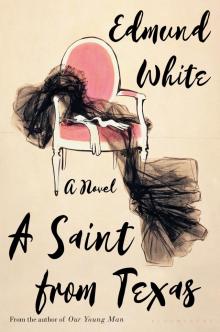 A Saint from Texas
A Saint from Texas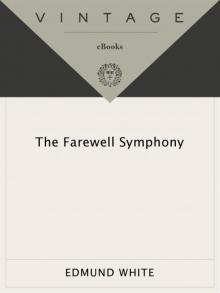 The Farewell Symphony
The Farewell Symphony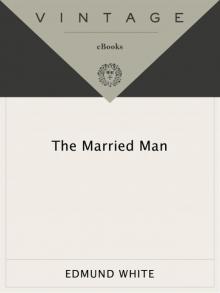 The Married Man
The Married Man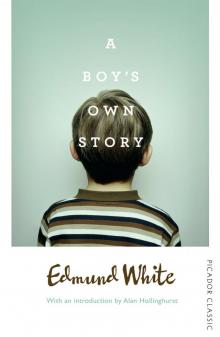 A Boy's Own Story
A Boy's Own Story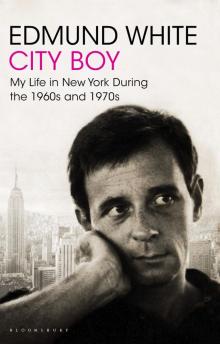 City Boy
City Boy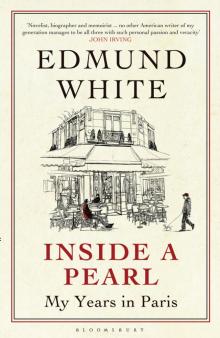 Inside a Pearl
Inside a Pearl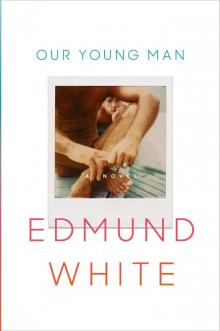 Our Young Man
Our Young Man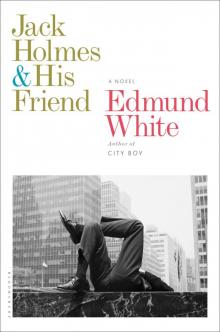 Jack Holmes and His Friend
Jack Holmes and His Friend